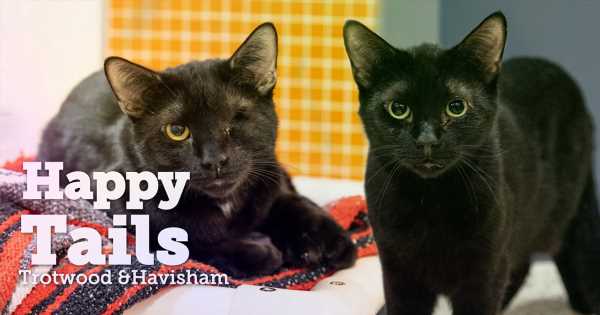Shy Cats, Trotwood and Havisham, Find a Safe and Patient Place to Land
A year and a half after losing his beloved cats, Jack E. finally felt ready to open his heart again. As a monthly ASPCA donor, Jack received an email from us promoting senior pet adoption and thought, “Why not?”
He applied for a senior cat, but by the time he was able to meet the cat, they had already been adopted. Instead, our Matchmaking team suggested he meet a pair of cats named Trotwood and Havisham.
“I hadn’t thought of adopting two, but I actually thought that was a great idea because I’m away a lot and the cats can be companions for each other,” Jack explains.

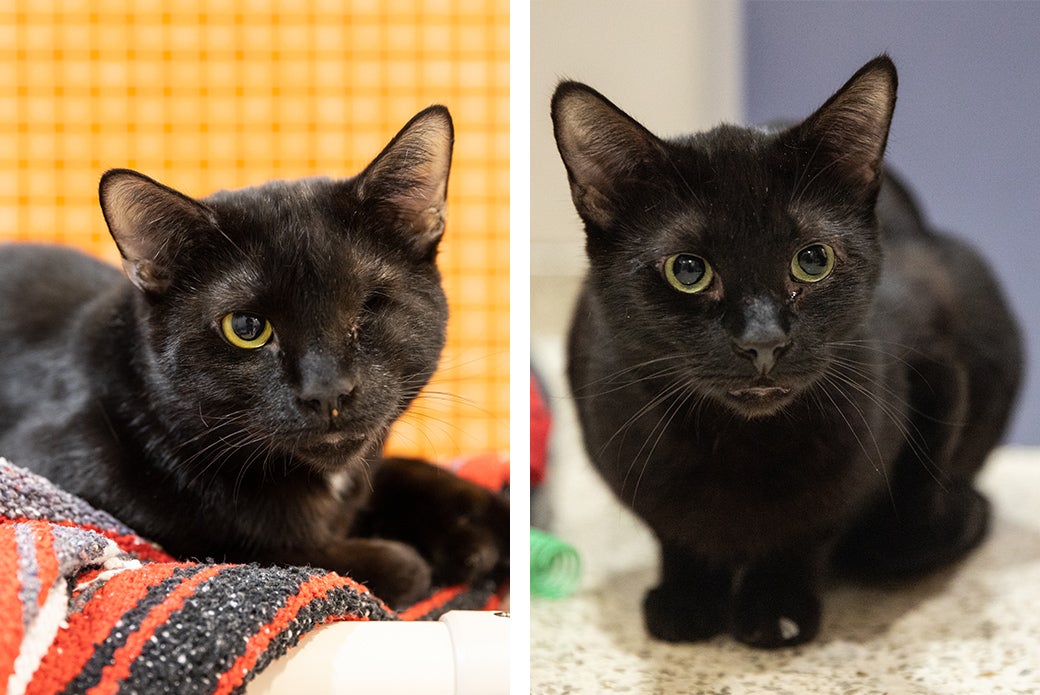
Though Trotwood and Havisham were younger and shier than he’d expected to adopt, Jack was ready to give the beautiful three-year-old kitties a chance.
“I think I realized they were meant for me just for the fact that it’s kind of materialized that way,” says Jack. “I was looking for another kind of cat, but they were presented to me as cats who needed a home and it didn’t really take much to surrender to that and say, ‘Okay, this must be what I’m supposed to do.’”
Crowded Beginnings
Trotwood and Havisham were two of 28 cats who were surrendered to the ASPCA by an overwhelmed caregiver. Though none of the cats showed signs of serious injury or disease, many had untreated upper respiratory infections (URIs) and dental issues, and most of the cats were small and thin. In addition, some of the cats were very shy and skittish.
Trotwood and Havisham were no exception. Due to their untreated dental disease, both cats had to have teeth removed. Trotwood had 11 teeth pulled and Havisham had five. Additionally, due to an untreated URI, Trotwood had to have his left eye removed to make him more comfortable and to prevent further complications. Havisham also tested positive for Feline Immunodeficiency Virus (FIV). Along with their medical issues, both cats are very shy and get stressed out in new environments.

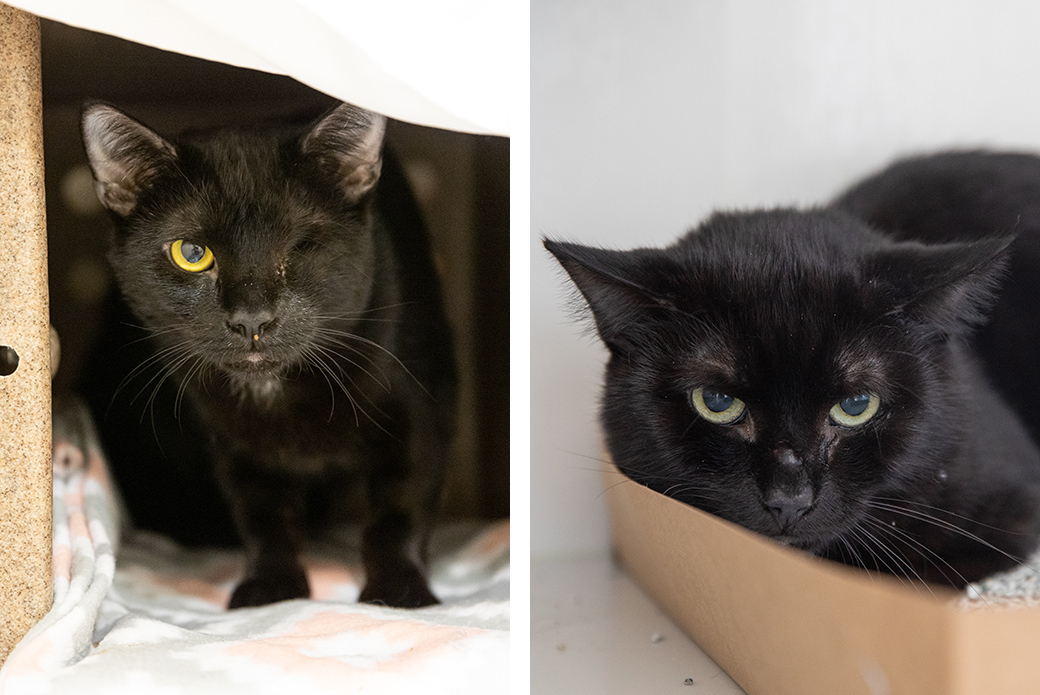
“A lot of cats from hoarding cases are undersocialized, meaning they haven’t had a lot of exposure to many people,” explains Adi Havov, Senior Manager of Behavior at the ASPCA Adoption Center. “We work really hard to set them up in an environment where they have the choice of whether to interact with us. In some cases, cats from hoarding situations really appreciate having another cat around and that’s when they feel most comfortable.”
Because Trotwood and Havisham thrived in each other’s company and felt more comfortable together, the staff at the Adoption Center deemed the pair “bonded.” This means that the cats must go home together. And thankfully, Jack was willing to take on the duo.
Arriving Home
On December 11, 2022, four months after their arrival to the ASPCA, Jack came to pick up his new kitties.
“When I picked the cats up, they were very nervous,” Jack tells us. “Trotwood was shaking he was so nervous. When I got home and opened the cage, they immediately went looking for a place to hide.”
Both cats found hiding places in Jack’s living room. One hid under Jack’s piano while the other hid under a chair.

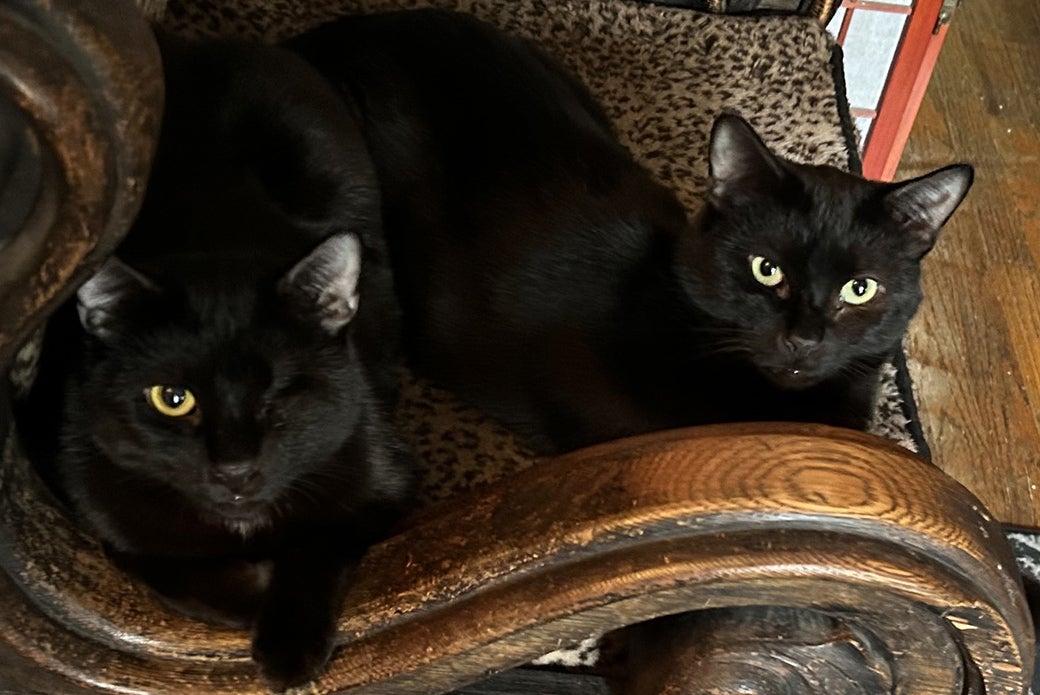
Though it took some time, eventually the pair came out from their hiding spots to eat. That’s when Jack took notice that both cats were very anxious around food, especially Trotwood.
“I knew they had been food compromised because they were completely neurotic around food,” Jack recalls. “It was really astonishing to witness. As soon as they heard me getting the food ready, Trotwood would start to run a racecourse around the living room and kitchen. Then, when I would put down the food, Trotwood would attack it and fling it and there would be bits of food all over the place and then he would sneak back and get more. It was really disturbing to watch because I realized he was traumatized.”
It took about a month for Trotwood and Havisham to calm down around food and realize that it was always going to be there, though Trotwood “still does his little run-around” every time he hears Jack preparing his meals.
Working Through Challenges
Although the pair have gotten more comfortable around food, they still aren’t ready for human affection.
“They’ve taken a long time to socialize and they’re still not there yet, although their behavior has gotten much calmer. I think they’re more comfortable here,” explains Jack. “I have the attitude that I’m just not going to force them. I will every now and then try to touch them or, when I put down their food, try to stroke their back but I know I cannot force it.”

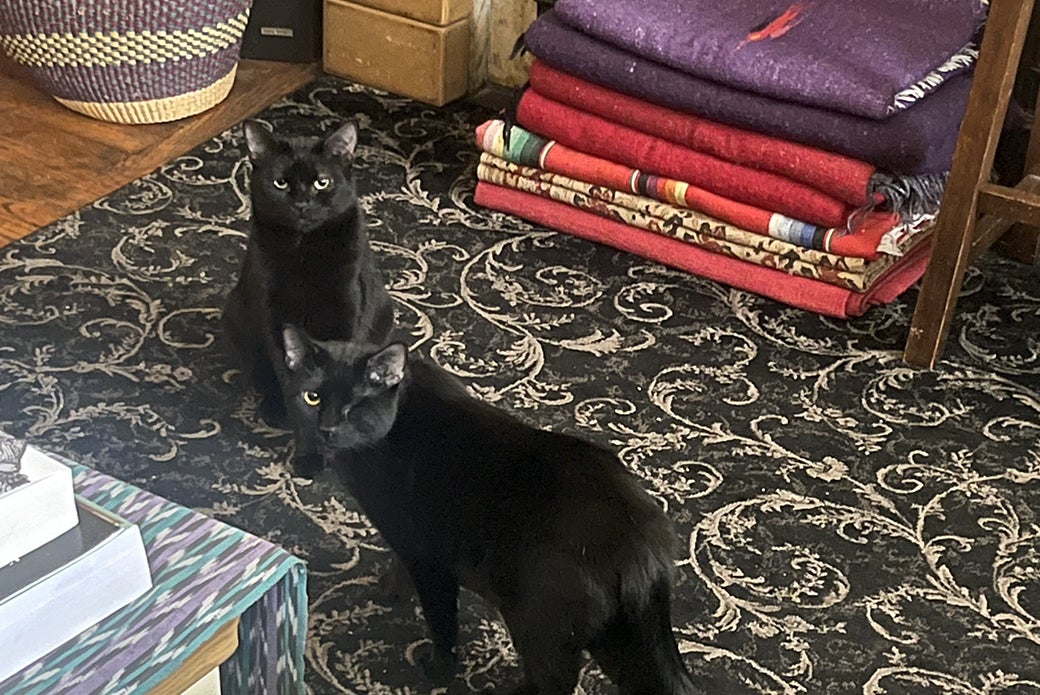
Having always had physically affectionate cats in the past, Jack has found Trotwood and Havisham’s timidness to be one of the greatest challenges he’s had to face since adopting them.
“I had to get used to the fact that they were traumatized, and they were going to avoid me for a while,” says Jack. “Physically it wasn’t hard, I just had to put down their food and walk away, but emotionally it was difficult. I wanted to bond with them, and I knew if that was going to happen, it wasn’t going to be quick.”
Jack even had a cat whisperer come to the home to see if she could help the cats feel more comfortable around him.
“She had a long teaspoon that she put food in and showed me how to slowly retract it so they would eventually crawl up my lap,” Jack remembers. “That kind of started to help them settle down.”
Letting Their Personalities Shine
While Jack continues to work with the duo on being more relaxed around him, they have certainly gotten used to their new digs. The pair love to play and run around the apartment and their personalities have started to blossom.
“When they play, they’ll just start chasing each other and it gets really fast and furious and they’ll zip through the living room chasing each other,” says Jack. “A couple of times Havisham has leapt straight up into the air and over me.”
Even though he’s missing his left eye, Trotwood doesn’t let it slow him down, especially when it comes to playing and exploring.
“So far as I can tell, not having an eye doesn’t limit Trotwood in any way,” Jack tells us. “He just seems to be completely happy. He’s very athletic and comes racing right up the stairs to my loft bed, runs along the bookshelves, walks along the narrow guardrail, so I think he’s fine!”
In fact, of the two, Trotwood is the bolder one. He loves to explore, and Jack believes he’s “disposed to be friendly,” while Havisham is more reserved and suspicious of what’s going on around him.


While both cats are still timid around him, Jack has noticed many small signs of progress that count as big wins. When they stopped attacking their food, or when Trotwood first rubbed against Jack’s leg while he was dishing out their food and, as a huge win, when they started eating snacks out of his hand.
“Every little sign of progress makes me feel good,” says Jack.
Another big step came the night prior to our interview with Jack.
After being away on a trip, when Jack arrived home and eventually got into bed, he realized that both cats were coming up the stairs and crawling along the edge of his bed, something they’d never done before!
Feeling Grateful
Although the process of adapting is a bit slower than Jack would’ve hoped for, he is still incredibly happy with his decision to adopt Trotwood and Havisham.
“I’m happy with them because they’re just lovely animals,” Jack tells us. “They really enjoy each other’s company. They tumble around on the floor and play and chase each other and I just love that.”
Jack has also found this time as an opportunity to work on qualities within himself.
“I think everything that happens in my life is an experience that I get to have or a lesson I haven’t learned yet or an opportunity to learn something new,” he says. “For me, having these two cats has really been about patience and acceptance and giving. It’s really wonderful I get to share my life with these two animals because they’re very beautiful and they seem to take care of themselves and each other very well. It’s really given me a strong mandate to be very patient and trust this process.”

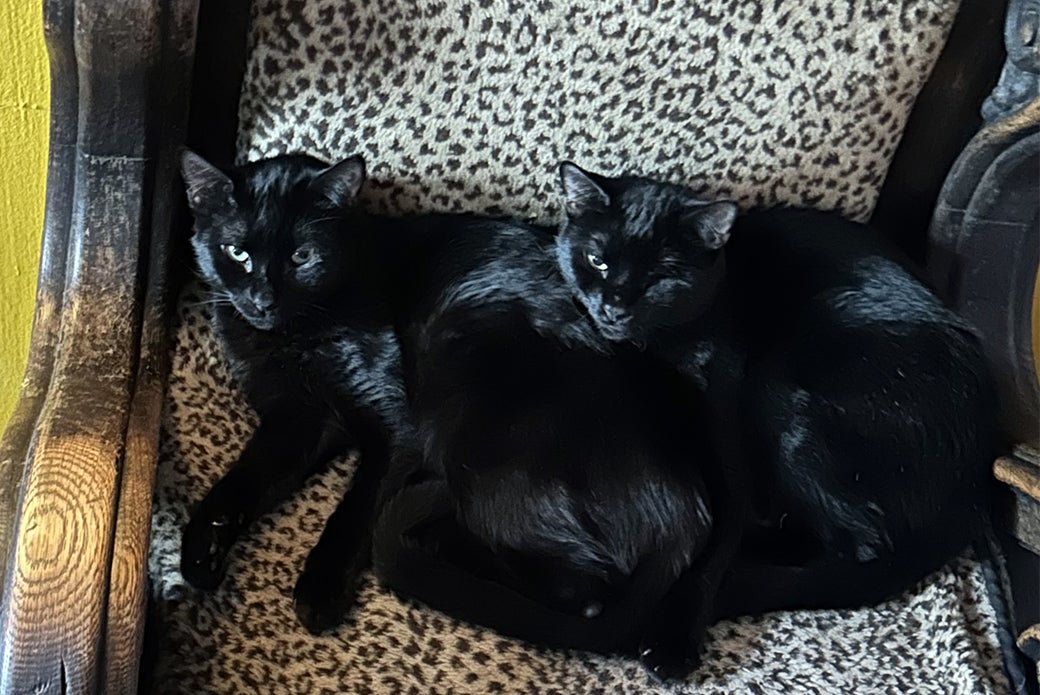
Jack isn’t the only one who’s happy with his decision to adopt, our staff at the Adoption Center couldn’t be more thrilled for Trotwood and Havisham to have found the home they deserve.
“Giving these cats a chance to be in a loving home is what we’re all about,” says Adi. “And we’re so happy that they have found someone like Jack who understands that they need a little extra patience sometimes to come around, but that they can be really rewarding companions.”
Find Your Trotwood and Havisham
At the ASPCA, we very often come across cats who are undersocialized, shy, and because of their past, may always be timid around new people and environments, but still deserve a loving home like any other cat. We strongly encourage adopters to consider opening their hearts to cats like Trotwood and Havisham and give them the opportunity to feel safe and comfortable in a loving home.
Jack offers some advice to anyone who may be considering adoption.
“Since I’ve had many cats in my life and for long periods of time, I would say be prepared to be delighted because cats are wonderfully independent and can be very friendly but can also be very remote and self-contained and they’re just extraordinary animals to watch. It’s wonderful to watch how resilient they are.”
He continues, “As far as adopting cats who are traumatized, I would just say it’s a great opportunity to learn patience and it’s a great heart opening experience. They’re adorable animals and I realize they’ve had a bad time and it feels really special to know that I’m going to provide a really safe home for them—they maybe don’t know it yet—but I’m going to provide a safe, clean home and they’re going to be okay here. That makes me feel good.”
Source: Read Full Article
